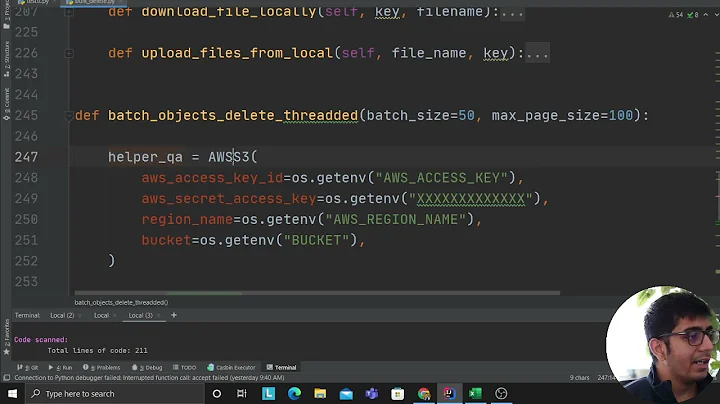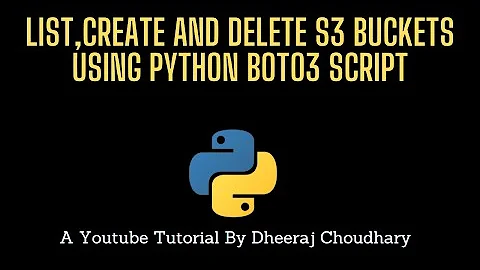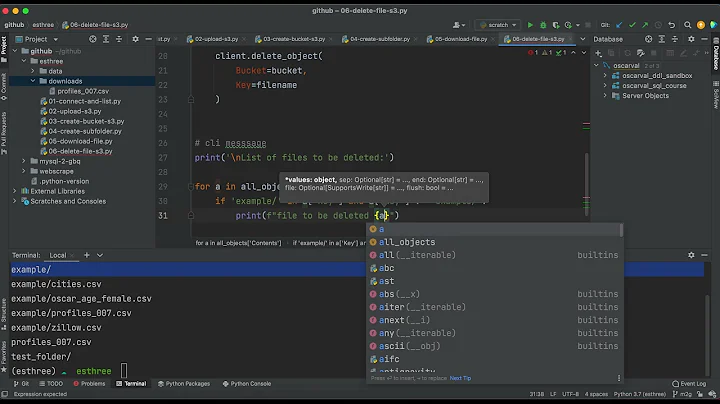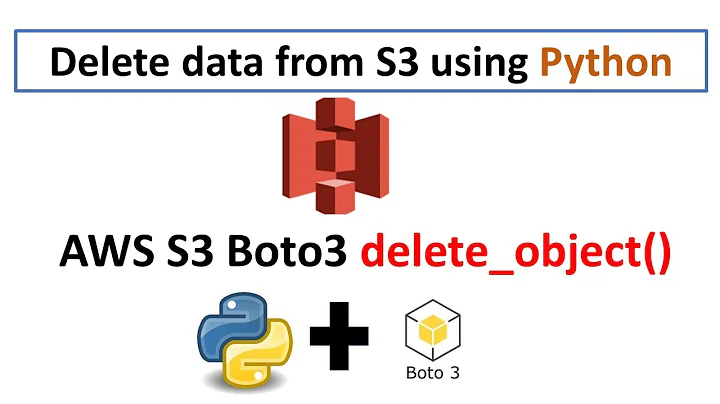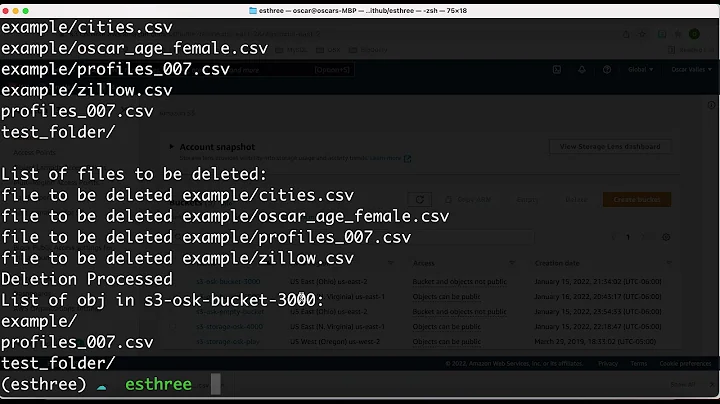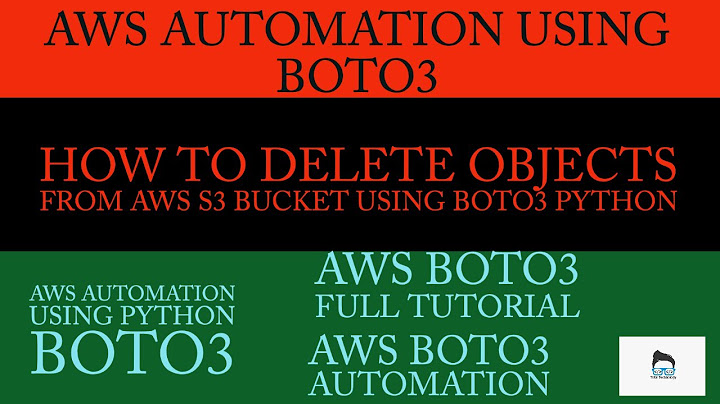Delete all versions of an object in S3 using python?
Solution 1
As a supplement to @jarmod's answer, here is a way I developed a workaround to "hard deleting" an object (with delete markered objects included);
def get_all_versions(bucket, filename):
s3 = boto3.client('s3')
keys = ["Versions", "DeleteMarkers"]
results = []
for k in keys:
response = s3.list_object_versions(Bucket=bucket)[k]
to_delete = [r["VersionId"] for r in response if r["Key"] == filename]
results.extend(to_delete)
return results
bucket = "YOUR BUCKET NAME"
file = "YOUR FILE"
for version in get_all_versions(bucket, file):
s3.delete_object(Bucket=bucket, Key=file, VersionId=version)
Solution 2
The other answers delete objects individually. It is more efficient to use the delete_objects boto3 call and batch process your delete. See the code below for a function which collects all objects and deletes in batches of 1000:
bucket = 'bucket-name'
s3_client = boto3.client('s3')
object_response_paginator = s3_client.get_paginator('list_object_versions')
delete_marker_list = []
version_list = []
for object_response_itr in object_response_paginator.paginate(Bucket=bucket):
if 'DeleteMarkers' in object_response_itr:
for delete_marker in object_response_itr['DeleteMarkers']:
delete_marker_list.append({'Key': delete_marker['Key'], 'VersionId': delete_marker['VersionId']})
if 'Versions' in object_response_itr:
for version in object_response_itr['Versions']:
version_list.append({'Key': version['Key'], 'VersionId': version['VersionId']})
for i in range(0, len(delete_marker_list), 1000):
response = s3_client.delete_objects(
Bucket=bucket,
Delete={
'Objects': delete_marker_list[i:i+1000],
'Quiet': True
}
)
print(response)
for i in range(0, len(version_list), 1000):
response = s3_client.delete_objects(
Bucket=bucket,
Delete={
'Objects': version_list[i:i+1000],
'Quiet': True
}
)
print(response)
Solution 3
I had trouble using the other solutions to this question so here's mine.
import boto3
bucket = "bucket name goes here"
filename = "filename goes here"
client = boto3.client('s3')
paginator = client.get_paginator('list_object_versions')
response_iterator = paginator.paginate(Bucket=bucket)
for response in response_iterator:
versions = response.get('Versions', [])
versions.extend(response.get('DeleteMarkers', []))
for version_id in [x['VersionId'] for x in versions
if x['Key'] == filename and x['VersionId'] != 'null']:
print('Deleting {} version {}'.format(filename, version_id))
client.delete_object(Bucket=bucket, Key=filename, VersionId=version_id)
This code deals with the cases where
- object versioning isn't actually turned on
- there are DeleteMarkers
- there are no DeleteMarkers
- there are more versions of a given file than fit in a single API response
Mahesh Mogal's answer doesn't delete DeleteMarkers. Mangohero1's answer fails if the object is missing a DeleteMarker. Hari's answer repeats 10 times (to workaround missing pagination logic).
Solution 4
The documentation is helpful here:
- When versioning is enabled in an S3 bucket, a simple DeleteObject request cannot permanently delete an object from that bucket. Instead, Amazon S3 inserts a delete marker (which is effectively a new version of the object with its own version ID).
- When you try to GET an object whose current version is a delete marker, S3 behaves as if the object has been deleted (even though it has not) and returns a 404 error.
- To permanently delete an object from a versioned bucket, use DeleteObject, with the relevant version ID, for each and every version of the object (and that includes the delete markers).
Solution 5
You can use object_versions.
def delete_all_versions(bucket_name: str, prefix: str):
s3 = boto3.resource('s3')
bucket = s3.Bucket(bucket_name)
if prefix is None:
bucket.object_versions.delete()
else:
bucket.object_versions.filter(Prefix=prefix).delete()
delete_all_versions("my_bucket", None) # empties the entire bucket
delete_all_versions("my_bucket", "my_prefix/") # deletes all objects matching the prefix (can be only one if only one matches)
Related videos on Youtube
Comments
-
 rooscous 3 months
rooscous 3 monthsI have a versioned bucket and would like to delete the object (and all of its versions) from the bucket. However, when I try to delete the object from the console, S3 simply adds a delete marker but does not perform a hard delete.
Is it possible to delete all versions of the object (hard delete) with a particular key?:
s3resource = boto3.resource('s3') bucket = s3resource.Bucket('my_bucket') obj = bucket.Object('my_object_key') # I would like to delete all versions for the object like so: obj.delete_all_versions() # or delete all versions for all objects like so: bucket.objects.delete_all_versions()-
 rooscous about 5 yearsok, I will have to test this. It has an optional
rooscous about 5 yearsok, I will have to test this. It has an optionalVersionIdparameter, so that makes me think that if I do not explicitly provide the version id for each object, it will just perform a soft delete (delete marker only). -
 jarmod about 5 yearsI highly recommend the documentation: docs.aws.amazon.com/AmazonS3/latest/dev/….
jarmod about 5 yearsI highly recommend the documentation: docs.aws.amazon.com/AmazonS3/latest/dev/….
-
-
 rooscous about 5 yearsHi jarmod. Thanks for the response -- I did read the documentation, but I wanted to know if this is really the only way to do it (i.e. get a list of all versions of the object and delete each one iteratively).
rooscous about 5 yearsHi jarmod. Thanks for the response -- I did read the documentation, but I wanted to know if this is really the only way to do it (i.e. get a list of all versions of the object and delete each one iteratively). -
 gene_wood about 4 yearsThis solution doesn't delete
gene_wood about 4 yearsThis solution doesn't deleteDeleteMarkers. I added a solution here that accounts for the case where a file does or doesn't have aDeleteMarker -
 gene_wood almost 4 yearsExcellent, I didn't know about
gene_wood almost 4 yearsExcellent, I didn't know aboutdelete_objects. Out of curiosity, why do you build the two lists,delete_marker_listandversion_listindependently and then iterate over them independently? Would it work to just build one list combining all versions and delete markers, then iterate over that single list in steps of 1000? -
 AndrewC almost 4 yearsJust for clarity.
AndrewC almost 4 yearsJust for clarity. -
 San over 3 yearsThis should really be upvoted more as it sheds light on the actual workings through documentation.
San over 3 yearsThis should really be upvoted more as it sheds light on the actual workings through documentation. -
 Evgeny Goldin almost 3 yearsThanks a lot! Used it to nuke all not latest versions (not version['IsLatest']) after disabling bucket versioning.
Evgeny Goldin almost 3 yearsThanks a lot! Used it to nuke all not latest versions (not version['IsLatest']) after disabling bucket versioning. -
 Emma Y over 2 yearsThis is really great example . Thank you
Emma Y over 2 yearsThis is really great example . Thank you
